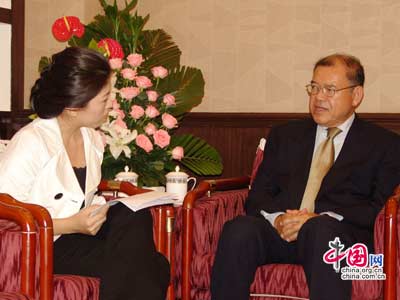| Videos | ? Latest |
|
? Feature | ? Sports | ? Your Videos |
UNCTAD leader analyses the current financial crisis
|
|
|
China.org.cn interviewed Dr. Supachai Panitchpakdi. |
A transcript of the interview:
Welcome to China Talk. Two years ago in August 2007, the global financial crisis started in the United States. Since then, the world economy has been damaged severely by this crisis, which was referred to as “the worst financial crisis since the Great Depression”. Two years later, people are still wondering how the world economy is now; is the bottom of the crisis in sight; what lessons can we learn from this crisis. Today we are very honored to invite Dr. Supachai Panitchpakdi to talk to us about the current phase of the financial crisis. Dr. Supachai is the Secretary-General of the United Nations Conference of Trade and Development (UNCTAD).
China.org.cn: A lot of people say that the worst of the global crisis is over and that the world economy is bouncing back. In fact, recently there indeed have been some positive economic figures supporting this theory. For example, the US S&P 500 index has risen by almost 50% in the past five month and etc. What’s your view on this? Do you think the world economy is improving?
Dr. Supachai: To say that the worst is behind us may be partly right. And we’ve seen the depth of the crisis. But of course always we would have to caution against the falling back into the track of over-complacency. And this is something I would like to see, a longer period of consumer confidence growing, a longer time of manufacturing growth, and particularly the changes in the labor market taking place in a positive way. I think we can be pleased with certain facts that stimulus measures have produced kind of effect. But the need to be working together on a multilateral basis, the need to be looking at the tightening up of the financial system and reforms- all this will not go away; all this will still be much needed. All this needs to be done after the crisis, to be done at the moment.
China.org.cn: As we know, the global crisis had swiped the whole world. But what particular impact has the global financial crisis had on developing countries/ emerging economies? Why do these developing countries have to bear the brunt of a crisis that is originated in the U.S. and other developed countries?
Dr. Supachai: That’s why it’s so sad, because developing countries have been doing so well. Particularly those in the Africa, the poorest economies - the LDCs - these developing economies have been growing, up until 2007, on an average rate of 5-6%. Now they have to fall back to the level of 1-2%, which means a negative growth in terms of income capita. The impact, as you said, will be in terms of the fight against poverty. We would have much steeper mountains to climb, because the level of people living under the poverty line will increase, the number of unemployed people in developing countries will increase tremendously, and particularly the women and the youngsters. So impact will be felt long after the advanced economy has come out of the recession. In order to help these countries- it’s not just for the advanced economies to come out of the crisis themselves and pronounce that the global crisis is over. It’s not over. The global crisis may be over for the advanced economies that have caused the crisis, but the rest of the world is taking on the brunt. So there must be transfer of funds, transfer of financial support to help relieve these countries, to help relieve, particularly at the moment we are asking for debt relieve, particularly the official debt relieve.
China.org.cn: As we know, you know a lot about the 1997 Asian financial crisis, since you were appointed Ministry of Commerce in Thailand at that time. In your opinion, did the experience of combating the Asian financial crisis help in dealing with the current global crisis? How can we prevent similar crises from happening in the future?
Dr. Supachai: The first thing is the debt issue. You have to look very carefully at the debt issue. And we used to be preoccupied with government debts in the 70s and 80s. But it’s the private debts that actually killed us in the 1990s. So first we must be aware of the private indebtedness. Secondly we must not allow exchange rate to move out of tuned, to move beyond the level that is sustainable on a real exchange rate basis. If it moves out that basis, we would fall prey to the speculators. And thirdly, I think we need to balance ourselves better in the way we revive our domestic economy and retrieve with the rest of the world. So there should be better imbalances between external and domestic demand.
China.org.cn: China’s major economic indicators have also shown signs of recovery and most Chinese experts think that China will continue the trend toward recovery. What’s your view on this? There are also concerns that China may need new stimulus policies after the current 4 trln yuan package runs out. Do you think China may need further stimulus in the near future?
Dr. Supachai: I think china has done very well in the substantial sides of its stimulus package. It has done well to have encouraged its banks to lend, which is one of the most successful cases in the world that Chinese banks have been lending. So all this has been well done, I don’t know whether there should be another round of stimulus, but I think the expansionary fiscal administrative policy should go on. So I’m sure the Chinese government will not be reversing this at the moment - to go on productive investment projects, public investment projects, health, education, infrastructure, and green technology, all this is needed as part of the stimulus measures. Monetary policies cannot be reversed at the moment, although the Chinese government is right to have alerted the banking system to be aware of the rise in the quality of loans and doubtful debts. So I think this is a right approach - be aware of what you have done, look at the quality, keep analyzing what has happened. You see because no one has the experience with this kind of crisis, so you have to keep doing things, persistent in doing that still now and keep analyzing before. I don’t think at the moment you need a really another round but just to go on with the kind of expansionary policy.
Supachai Panitchpakdi is the Secretary-General of the United Nations Conference of Trade and Development (UNCTAD). During the 1997 Asian financial crisis, he served as Deputy Prime Minister and Minister of Commerce of Thailand, in which capacity he successfully coordinated his country's response to the Asian financial crisis of the mid-1990s. Dr. Supachai was also the Director-General of the World Trade Organization (WTO) from September 2002 to August 2005, being the first national from a developing country to head the organization.

 0 Comments
0 Comments







